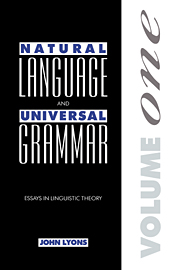Book contents
- Frontmatter
- Contents
- Preface
- Typographical conventions
- 1 Language, speech and writing
- 2 In defence of (so-called) autonomous linguistics
- 3 Linguistic theory and theoretical linguistics
- 4 Natural, non-natural and unnatural languages: English, Urdu and other abstractions
- 5 The origin of language, speech and languages
- 6 Phonemic and non-phonemic phonology: some typological reflections
- 7 Towards a ‘notional’ theory of the ‘parts of speech’
- 8 Deixis as the source of reference
- 9 Deixis and anaphora
- Appendix: The scientific study of language. Inaugural Lecture, Edinburgh, 1965
- Notes
- References
- Subject index
- Names index
4 - Natural, non-natural and unnatural languages: English, Urdu and other abstractions
Published online by Cambridge University Press: 05 June 2012
- Frontmatter
- Contents
- Preface
- Typographical conventions
- 1 Language, speech and writing
- 2 In defence of (so-called) autonomous linguistics
- 3 Linguistic theory and theoretical linguistics
- 4 Natural, non-natural and unnatural languages: English, Urdu and other abstractions
- 5 The origin of language, speech and languages
- 6 Phonemic and non-phonemic phonology: some typological reflections
- 7 Towards a ‘notional’ theory of the ‘parts of speech’
- 8 Deixis as the source of reference
- 9 Deixis and anaphora
- Appendix: The scientific study of language. Inaugural Lecture, Edinburgh, 1965
- Notes
- References
- Subject index
- Names index
Summary
The immediate and most readily identifiable sources of this chapter are, on the one hand, Katz's (1981) book, Language and Other Abstract Objects, which supplies part of the title, and, on the other, Pateman's (1983) article, ‘What is a language?’. The ideas that it contains are ideas that I have held, I think, for many years; but I have been greatly assisted in clarifying them, to my own satisfaction at least, by reading and pondering the two works that I have just mentioned and others by the same authors (Katz, 1984; Pateman, 1982, 1985).
My title deliberately echoes the title of Katz (1981): I have, however, substituted the term ‘abstraction’ for his ‘abstract object’, and I will explain presently why I have done this. More immediately to the point, it also echoes, and is intended to evoke, his initial formulation of the goals of the philosophy of linguistics:
Whereas linguistics tries to construct theories to answer the questions, first, ‘What is English, Urdu, and other natural languages?’ and second, ‘What is language in general?’, the philosophy of linguistics tries to construct philosophical theories to answer the questions, first, ‘What are theories of English, Urdu, and other natural languages?’, and second, ‘What is a theory of language in general?’
(Katz, 1981: 21).There are several points worth noting here. For present purposes, it suffices to mention the following:
(i) English, Urdu, etc. are implicitly classified as natural languages;
(ii) a grammar of a natural language is assumed to be a theory of that language;
[…]
- Type
- Chapter
- Information
- Natural Language and Universal GrammarEssays in Linguistic Theory, pp. 46 - 72Publisher: Cambridge University PressPrint publication year: 1991



